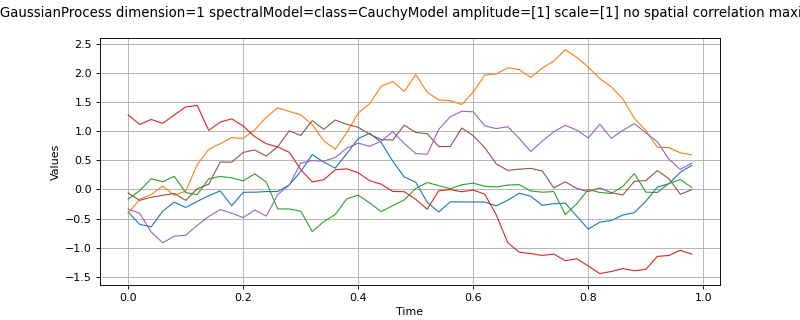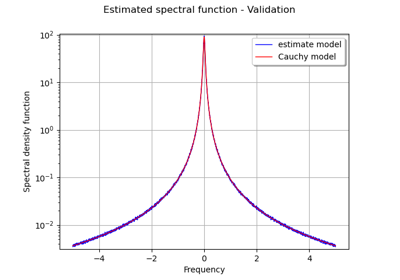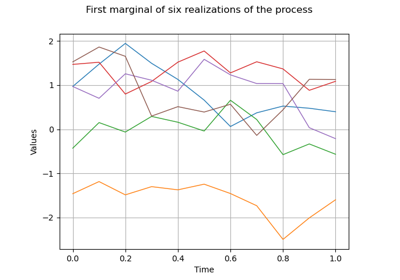SpectralGaussianProcess¶
(Source code, png)

- class SpectralGaussianProcess(*args)¶
Spectral Gaussian process.
- Available constructors:
SpectralGaussianProcess(spectralModel, timeGrid)
SpectralGaussianProcess(spectralModel, maxFreq, N)
- Parameters:
- timeGrid
RegularGrid The time grid associated to the process. The algorithm is only implemented when the mesh is a regular grid.
- spectralModel
SpectralModel - maxFreqfloat
Equal to the maximal frequency minus
.
- Nfloat
The number of points in the frequency grid, which is equal to the number of time stamps of the time grid.
- timeGrid
Methods
Accessor to the object's name.
Get a continuous realization.
Accessor to the covariance model.
Get the description of the process.
Get the FFT algorithm used to generate realizations of the spectral Gaussian process.
Get the frequency grid used to discretize the spectral model.
Get the frequency step
used to discretize the spectral model.
getFuture(*args)Prediction of the
future iterations of the process.
Get the dimension of the domain
.
getMarginal(*args)Get the
marginal of the random process.
Get the maximal frequency used in the computation.
getMesh()Get the mesh.
Get the number of points in the frequency grid.
getName()Accessor to the object's name.
Get the dimension of the domain
.
Get a realization of the process.
getSample(size)Get
realizations of the process.
Get the spectral model.
Get the time grid of observation of the process.
getTrend()Accessor to the trend.
hasName()Test if the object is named.
Test whether the process is composite or not.
isNormal()Test whether the process is normal or not.
Test whether the process is stationary or not.
setDescription(description)Set the description of the process.
setFFTAlgorithm(fft)Set the FFT algorithm used to generate realizations of the spectral Gaussian process.
setMesh(mesh)Set the mesh.
setName(name)Accessor to the object's name.
setTimeGrid(timeGrid)Set the time grid of observation of the process.
AdaptGrid
Notes
In the first usage, we fix the time grid and the second order model (spectral density model) which implements the process. The frequency discretization is deduced from the time discretization by the formulas
In the second usage, the process is fixed in the frequency domain. fmax value and N induce the time grid. Care: the maximal frequency used in the computation is not fmax but
.
In the third usage, the spectral model is given and the other arguments are the same as the first usage.
In the fourth usage, the spectral model is given and the other arguments are the same as the second usage.
The first call of
getRealization()might be time consuming because it computeshermitian matrices of size
, where
is the dimension of the spectral model. These matrices are factorized and stored in order to be used for each call of the getRealization method.
Examples
Create a SpectralGaussianProcess from a spectral model and a time grid:
>>> import openturns as ot >>> amplitude = [1.0, 2.0] >>> scale = [4.0, 5.0] >>> spatialCorrelation = ot.CorrelationMatrix(2) >>> spatialCorrelation[0,1] = 0.8 >>> myTimeGrid = ot.RegularGrid(0.0, 0.1, 20) >>> mySpectralModel = ot.CauchyModel(scale, amplitude, spatialCorrelation) >>> mySpectNormProc1 = ot.SpectralGaussianProcess(mySpectralModel, myTimeGrid)
- __init__(*args)¶
- getClassName()¶
Accessor to the object’s name.
- Returns:
- class_namestr
The object class name (object.__class__.__name__).
- getContinuousRealization()¶
Get a continuous realization.
- Returns:
- realization
Function According to the process, the continuous realizations are built:
either using a dedicated functional model if it exists: e.g. a functional basis process.
or using an interpolation from a discrete realization of the process on
: in dimension
, a linear interpolation and in dimension
, a piecewise constant function (the value at a given position is equal to the value at the nearest vertex of the mesh of the process).
- realization
- getCovarianceModel()¶
Accessor to the covariance model.
- Returns:
- cov_model
CovarianceModel Covariance model, if any.
- cov_model
- getDescription()¶
Get the description of the process.
- Returns:
- description
Description Description of the process.
- description
- getFFTAlgorithm()¶
Get the FFT algorithm used to generate realizations of the spectral Gaussian process.
- getFrequencyGrid()¶
Get the frequency grid used to discretize the spectral model.
- Returns:
- freqGrid
RegularGrid The frequency grid used to discretize the spectral model.
- freqGrid
- getFrequencyStep()¶
Get the frequency step
used to discretize the spectral model.
- Returns:
- freqStepfloat
The frequency step
used to discretize the spectral model.
- getFuture(*args)¶
Prediction of the
future iterations of the process.
- Parameters:
- stepNumberint,
Number of future steps.
- sizeint,
, optional
Number of futures needed. Default is 1.
- stepNumberint,
- Returns:
- prediction
ProcessSampleorTimeSeries future iterations of the process. If
, prediction is a
TimeSeries. Otherwise, it is aProcessSample.
- prediction
- getInputDimension()¶
Get the dimension of the domain
.
- Returns:
- nint
Dimension of the domain
:
.
- getMarginal(*args)¶
Get the
marginal of the random process.
- Parameters:
- kint or list of ints
Index of the marginal(s) needed.
- kint or list of ints
- Returns:
- marginals
Process Process defined with marginal(s) of the random process.
- marginals
- getMaximalFrequency()¶
Get the maximal frequency used in the computation.
- Returns:
- freqMaxfloat
The maximal frequency used in the computation:
.
- getNFrequency()¶
Get the number of points in the frequency grid.
- Returns:
- freqGrid
RegularGrid The number
of points in the frequency grid, which is equal to the number of time stamps of the time grid.
- freqGrid
- getName()¶
Accessor to the object’s name.
- Returns:
- namestr
The name of the object.
- getOutputDimension()¶
Get the dimension of the domain
.
- Returns:
- dint
Dimension of the domain
.
- getRealization()¶
Get a realization of the process.
- Returns:
- realization
Field Contains a mesh over which the process is discretized and the values of the process at the vertices of the mesh.
- realization
- getSample(size)¶
Get
realizations of the process.
- Parameters:
- nint,
Number of realizations of the process needed.
- nint,
- Returns:
- processSample
ProcessSample realizations of the random process. A process sample is a collection of fields which share the same mesh
.
- processSample
- getSpectralModel()¶
Get the spectral model.
- Returns:
- specMod
SpectralModel The spectral model defining the process.
- specMod
- getTimeGrid()¶
Get the time grid of observation of the process.
- Returns:
- timeGrid
RegularGrid Time grid of a process when the mesh associated to the process can be interpreted as a
RegularGrid. We check if the vertices of the mesh are scalar and are regularly spaced inbut we don’t check if the connectivity of the mesh is conform to the one of a regular grid (without any hole and composed of ordered instants).
- timeGrid
- getTrend()¶
Accessor to the trend.
- Returns:
- trend
TrendTransform Trend, if any.
- trend
- hasName()¶
Test if the object is named.
- Returns:
- hasNamebool
True if the name is not empty.
- isComposite()¶
Test whether the process is composite or not.
- Returns:
- isCompositebool
True if the process is composite (built upon a function and a process).
- isNormal()¶
Test whether the process is normal or not.
- Returns:
- isNormalbool
True if the process is normal.
Notes
A stochastic process is normal if all its finite dimensional joint distributions are normal, which means that for all
and
, with
, there is
and
such that:
where
,
and
and
is the symmetric matrix:
A Gaussian process is entirely defined by its mean function
and its covariance function
(or correlation function
).
- isStationary()¶
Test whether the process is stationary or not.
- Returns:
- isStationarybool
True if the process is stationary.
Notes
A process
is stationary if its distribution is invariant by translation:
,
,
, we have:
- setDescription(description)¶
Set the description of the process.
- Parameters:
- descriptionsequence of str
Description of the process.
- setFFTAlgorithm(fft)¶
Set the FFT algorithm used to generate realizations of the spectral Gaussian process.
- setName(name)¶
Accessor to the object’s name.
- Parameters:
- namestr
The name of the object.
- setTimeGrid(timeGrid)¶
Set the time grid of observation of the process.
- Returns:
- timeGrid
RegularGrid Time grid of observation of the process when the mesh associated to the process can be interpreted as a
RegularGrid. We check if the vertices of the mesh are scalar and are regularly spaced inbut we don’t check if the connectivity of the mesh is conform to the one of a regular grid (without any hole and composed of ordered instants).
- timeGrid
 OpenTURNS
OpenTURNS

